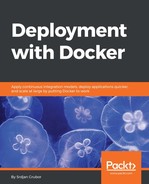Kubernetes is Google's cloud platform and orchestration engine that currently provides a bit more in terms of features than does Swarm. The setup of Kubernetes is much more difficult as you need: a master, a node (the worker according to our earlier dictionary), and pods (grouping of one or more containers). Pods are always co-located and co-scheduled, so handling their dependencies is a bit easier to deal with but you do not get the same isolation. The interesting thing to keep in mind here is that all containers within the pod share the same IP address/ports, share volumes, and are generally within the same isolation group. It is almost better to think of a pod as a small virtual machine running many services than many containers running in parallel.
Kubernetes has been gaining a massive amount of community traction lately and is probably the most deployed cluster orchestration and management system in use, though to be fair, finding exact figures is tricky, with a majority of them being deployed in private clouds. Given that Google has been using this system for a while and on such a large scale, it has a pretty proven track record and I would probably recommended it for medium-to-large scales. If you don't mind the overhead of setting everything up, I think even smaller scales would be acceptable, but in that space, Docker Swarm is so easy to use that using Kubernetes for it is generally impractical.

